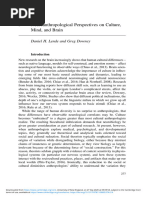Asynchronous Activity 1
Uploaded by
Mia Audrey Estrella CarlosAsynchronous Activity 1
Uploaded by
Mia Audrey Estrella CarlosCarlos, Mia Audrey E.
Asynchronous Activity 1
How can the integration of business and entrepreneurship activities in elementary education
contribute to the holistic development of students, fostering essential skills such as creativity,
teamwork, financial literacy, and an entrepreneurial mindset? Provide examples and discuss
the long-term impact of such educational initiatives on the students' personal and academic
growth.
Incorporating business and entrepreneurship activities into the primary school
curriculum can benefit children's overall development by cultivating a variety of critical abilities
and perspectives.
In elementary school, learning about entrepreneurship fosters creativity and problem-
solving abilities. Students strengthen their capacity for creative thought by formulating business
ideas, producing new products, and finding solutions to problems. These courses teach students
how to assign assignments, communicate effectively, and collaborate with others while
emphasizing cooperation and teamwork. Additionally, entrepreneurship education promotes
financial literacy by exposing children to budgeting, income, spending, and profit at a young
age. Practical assignments such as maintaining financial records and operating a class store can
provide real-world experience. Additionally, it cultivates a business-minded mindset, which
advances traits like initiative, risk-taking, adaptability, and resilience. Pupils gain the ability to
persevere in overcoming obstacles and to learn from failures.
Having students manage little businesses in the classroom and handle administrative
tasks like production, marketing, and finance is one approach to illustrate this connection.
Engage in specific activities like inspiration, problem-solving, and presenting concepts to groups
of people. Additionally, by allowing students to show new products or business ideas at
entrepreneurship fairs. Finally, by engaging with community mentors or company owners to
share information and inspire students.
Long-term benefits of this integration include improved critical thinking abilities.
Successful entrepreneurial endeavors elevate students' self-confidence and belief in
themselves. The relationship between entrepreneurial education and improved academic
performance due to heightened engagement and practical application of knowledge.
Acquisition of life skills, such as leadership, decision-making, and adaptability, is crucial for
navigating adulthood's challenges.
In conclusion, integrating business and entrepreneurship activities into elementary
education provides a dynamic learning environment that nurtures essential skills, attitudes, and
knowledge crucial for holistic student development, influencing their personal, academic, and
future professional growth.
You might also like
- Basics of Career Guidance and Counseling: How to Choose Your Best CareerFrom EverandBasics of Career Guidance and Counseling: How to Choose Your Best Career5/5 (2)
- Entrepreneurship Education: DR - Shamshir SinghNo ratings yetEntrepreneurship Education: DR - Shamshir Singh24 pages
- Resilience in Business: From Academic Challenges to Global LeadershipFrom EverandResilience in Business: From Academic Challenges to Global LeadershipNo ratings yet
- Module in EPP With Entrepreneurship MidtermNo ratings yetModule in EPP With Entrepreneurship Midterm29 pages
- Developing Entrepreneurial Competencies: A Student BusinessNo ratings yetDeveloping Entrepreneurial Competencies: A Student Business13 pages
- Mindset Mastery: Building Mental Resilience for Growth and SuccessFrom EverandMindset Mastery: Building Mental Resilience for Growth and SuccessNo ratings yet
- Lackeus 2014 - WP - Entrepreneurship in Education FINAL For OECD 141023No ratings yetLackeus 2014 - WP - Entrepreneurship in Education FINAL For OECD 14102342 pages
- Role of Formal Education in Entrepreneurship DevelopmentNo ratings yetRole of Formal Education in Entrepreneurship Development20 pages
- Learning and Development: How To Close The Skills Gap in Your OrganizationFrom EverandLearning and Development: How To Close The Skills Gap in Your OrganizationNo ratings yet
- Think Big, Grow Bigger: Mastering the Entrepreneurial MindsetFrom EverandThink Big, Grow Bigger: Mastering the Entrepreneurial MindsetNo ratings yet
- Assessment Rubric National Standards of Practice For Entrepreneurship EducationNo ratings yetAssessment Rubric National Standards of Practice For Entrepreneurship Education8 pages
- School Management: Principles of Management, Leadership, Planning and Organization: Innovative Education: Strategies, Challenges, and Solutions in PedagogyFrom EverandSchool Management: Principles of Management, Leadership, Planning and Organization: Innovative Education: Strategies, Challenges, and Solutions in PedagogyNo ratings yet
- Empowering Students For Success: Family Relationships are the Basis of the Student's SuccessFrom EverandEmpowering Students For Success: Family Relationships are the Basis of the Student's SuccessNo ratings yet
- The Action Plan For Entrepreneurship EducationNo ratings yetThe Action Plan For Entrepreneurship Education4 pages
- Enterprise in Education Educating Tommorrows EntrepreneursNo ratings yetEnterprise in Education Educating Tommorrows Entrepreneurs17 pages
- Ink & Insights: Mastering Business Coaching in the Digital AgeFrom EverandInk & Insights: Mastering Business Coaching in the Digital AgeNo ratings yet
- Blueprint For Business Growth Strategies For Aspiring EntrepreneursFrom EverandBlueprint For Business Growth Strategies For Aspiring EntrepreneursNo ratings yet
- ASS.^N2 (ENTREP) Entrepreneurship and Philippine EducationNo ratings yetASS.^N2 (ENTREP) Entrepreneurship and Philippine Education2 pages
- Single-Parent Households and Children's Educational Achievement A State-Level AnalysisNo ratings yetSingle-Parent Households and Children's Educational Achievement A State-Level Analysis1 page
- The Conceptual Process of 2 Becoming 1 (Repaired)No ratings yetThe Conceptual Process of 2 Becoming 1 (Repaired)6 pages
- HBO Chapter VI - Appraising and Rewarding PerformanceNo ratings yetHBO Chapter VI - Appraising and Rewarding Performance53 pages
- T2 S 857 Year 5 Animals Including Humans End of Unit Assessment Ver 1100% (1)T2 S 857 Year 5 Animals Including Humans End of Unit Assessment Ver 17 pages
- Carr 2003 Rethinking Empowerment Theory Using A Feminist Lens The Importance of ProcessNo ratings yetCarr 2003 Rethinking Empowerment Theory Using A Feminist Lens The Importance of Process13 pages
- FS 1 Episode 5 Creating An Appropriate Learning Environment DoneNo ratings yetFS 1 Episode 5 Creating An Appropriate Learning Environment Done16 pages
- Module #3 - The Self As Cognitive ConstructNo ratings yetModule #3 - The Self As Cognitive Construct6 pages
- InstructionalStrategies PedagogicalSkills HOTSNo ratings yetInstructionalStrategies PedagogicalSkills HOTS36 pages
- OceanofPDF.com Experiencing the Lifespan - Janet BelskyNo ratings yetOceanofPDF.com Experiencing the Lifespan - Janet Belsky591 pages

























































































